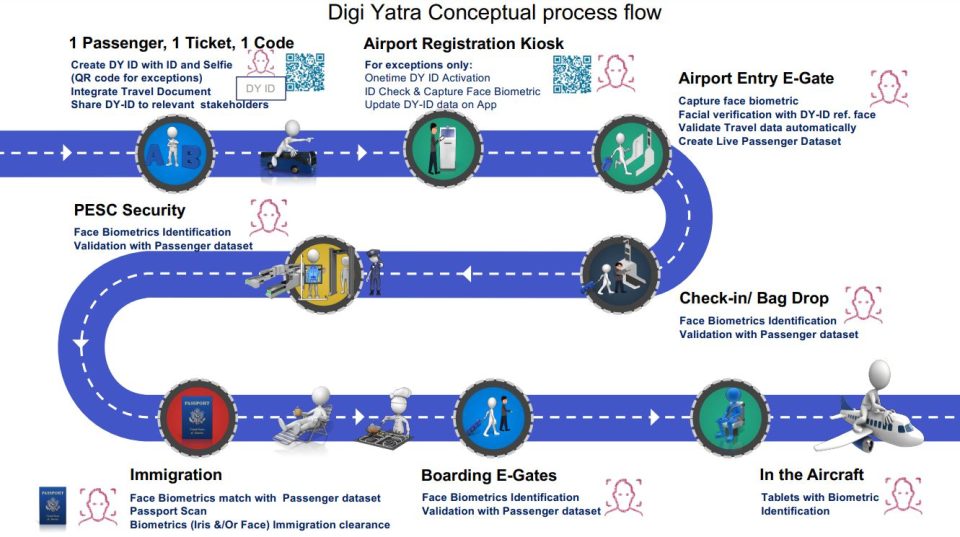
Know about Digi Yatra, the facial recognition tech for airports
At the check-in counter or at the Self Bag Drop counter, the passenger will be identified by face and there is no need to show any document or ID for this purpose.

From August 31, as part of the government’s “Digi Yatra” initiative, seven Indian airports are likely to implement face recognition technology that provides passengers a seamless, hassle-free and paperless journey.
Digi Yatra is a biometric-based digital processing of passengers at airports. It aims to simplify the passenger processes at various checkpoints in the airport right from the terminal entry gate, check-in/ bag drop, security check and boarding gates.
Also read: Dubai-bound SpiceJet flight makes emergency landing at Goa airport
With Digi Yatra, passengers will no longer need to show their tickets/ boarding passes and their physical Identity cards at many of the checkpoints at the airport, since the ticket/boarding pass is integrated with the identity document times, faster processing times and simpler processes. Digi Yatra will have a centralised registration system for passengers.
According to a Hindustan Times report, the first phase of the Digi Yatra initiative will be rolled out on August 31 at Kolkata, Varanasi, Pune, Vijayawada, Bangalore, Delhi and Hyderabad airports.
A mobile application, which will be available for Apple iPhones as well as those using Android devices, “is ready to be rolled out for this purpose and the back-end ecosystem with the issuers and verifiers is also tested and ready,” an official from the Bengaluru airport was quoted as saying in the report.
In April, the Minister of State for Civil Aviation Gen V K Singh (Retd) in a written reply to a question in Rajya Sabha, said, “Facial recognition system is part of the Digi Yatra initiative of the government for providing passengers seamless and hassle-free experience at airports. It is to be implemented in a phased manner. The first phase is planned at Kolkata, Varanasi, Pune, Vijayawada, Bangalore, Delhi and Hyderabad Airports by March 2023. Preliminary testing of the Digi Yatra Biometric boarding system with registration for the ‘Day of Travel’ at these airports has been completed.”
Also read: Delhi’s IGI airport best in India and South Asia, 37th among world’s top 50
“The requirement of security is dynamic in nature. The Bureau of Civil Aviation Security (BCAS), the regulatory authority for civil aviation security in the country, in consultation with other concerned agencies and stakeholders, reviews the security arrangements at airports from time to time and upgrade the same as per requirement,” he added.
How to enroll for Digi Yatra
Digi Yatra will have a centralised registration system for passengers. A passenger can create Digi Yatra ID in a central system by providing details such as name, email address, mobile number and details of identity (Voter ID, Driving License, Aadhaar etc).
On submission, Digi Yatra ID will be created. The passenger can quote this number while booking the ticket. The passenger data including Digi Yatra ID will be passed on to the departure airport by the airlines.
On first travel, the passenger has to go to registration kiosk at the airport for validating the ID. In the case of Aadhaar, the verification will be online. In the case of other ID, CISF will manually verify.
On successful verification, the photo of the passenger will be added to Digi Yatra profile in the central system.
Passengers who have enrolled once do not have to go to the registration kiosks for their subsequent travels.
Process at airport
At the entry point – E-Gate, the passenger will scan his boarding pass or e-ticket (Print or a soft copy on mobile).
On scanning the bar code/ QR code the system will validate the passenger details and flight details.
Digi Yatra ID will verify the identity by face recognition.
On successful verification of ticket and Digi Yatra ID, E-Gate will open. Also, face with ticket PNR is made into a single token for the rest of the journey at the airport.

Passengers will gain entry to the security area and aircraft Boarding through e-Gate operated on the Facial Recognition System.
At the check-in counter or at the Self Bag Drop counter, the passenger will be identified by face and there is no need to show any document or ID for this purpose.
The passenger will gain entry to the security check area through an E-Gate by facial recognition. Similarly at the boarding gate also the passenger will be identified by face for entering through an E-Gate for boarding the aircraft.
Passenger’s consent, deleting profile
As per the government, “At the time of consent collection, Digi Yatra Platform will strictly take consent from the user for sharing of face data for the airport checkpoint clearance only and optionally another consent to opt for any value added services that the passenger may wish to avail from the Digi Yatra ecosystem partners.”
“Airports may not create profile of users, or use this authentication for marketing without explicit user consent for marketing purpose. This consent shall be taken independently as a separate consent during registration of Digi Yatra customers. In case the airport does take marketing consent from user, this consent must be logged with the Digi Yatra Platform,” it added.
Further, it stated, “Creation and use of the Digi Yatra ID by a passenger will be completely voluntary, and a one-time registration process using a Govt. ID is needed to enroll into the Digi Yatra Platform. Users will also have an option, at any time, to opt-out and delete their profile.”
What privacy experts say
Privacy experts have sounded caution over the government’s Digi Yatra initiative.
“The government is assuming that face recognition technology is accurate, and it works all the time, which is not true. Testing the technology in lab and, in reality, it involves multiple things in place, is different,” said Anushka Jain, associate policy council, Internet Freedom Foundation, was quoted as saying in the HT report.
“If one submits his/ her Aadhar card as an ID proof, which has an old photo, there are high chances that the photo might not match the person’s current facial features. In this manner, the technology can become a hassle. Secondly, India does not have data protection law and so we do not know who the airport shares the data with (police, private technology companies etc). We do not know about how the data collection exercise will take place,” Jain added.


